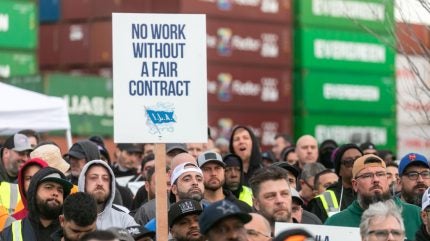
The port strike by members of the International Longshoremen’s Association, which began on 1 October after contract negotiations stalled, ended after a tentative agreement was reached on a wage increase and a short-term contract extension until 15 January.
The National Retail Federation (NRF) and Hackett Associates reported that whilst the disruption caused some temporary logistics challenges, no major impact on the upcoming holiday season is anticipated.
The move came after NRF led a coalition in asking President Biden to use “any and all available authority” to end the strike.
“It was a huge relief for retailers, their customers, and the nation’s economy that the strike was short-lived,” said Jonathan Gold, NRF vice president for supply chain and customs policy.
Ports across the country are working to recover with import volumes expected to remain steady in October.
“The strike wasn’t without impacts – retailers who brought in cargo early or shifted delivery to the West Coast face added warehousing and transportation costs,” added Gold. “But the priority now is for both parties to negotiate in good faith and reach a long-term contract before the short-term extension ends in mid-January. We don’t want to face a disruption like this all over again.”
Hackett Associates founder Ben Hackett noted that a surge in imports earlier this year was largely driven by precautionary measures taken by wholesalers and retailers ahead of the port strike, rather than an increase in demand.
“We may see some short-term congestion on the West Coast but nothing significant, and East Coast delays should be limited,” said Hackett.
In August, US ports handled 2.34m Twenty-Foot Equivalent Units (TEUs), up 0.9% from July and 19.3% higher than the previous year. September’s numbers are projected at 2.2m TEUs, with October forecasted at 2.12m TEUs, up 3.1% year over year. Despite the brief strike, the national port totals for October have not been significantly affected.
Looking ahead, the Global Port Tracker forecasts continue to show strong volumes through the end of 2024 with an anticipated 12.1% increase in total imports compared to 2023, reaching 24.9m TEUs.



